牛津6BUnit6-unit10知识点梳理
牛津英语六年级期末考试知识点梳理Unit 6—Unit 10

牛津英语六年级期末考试知识点梳理(unit 6—unit 10)Unit 6 Going to school1.live near school /live far away from school2.by bus = go by bus by ferry = go by ferryby underground = go by undergroundgo to school on foot = walk to school3.It takes sb. some time to do sth. 某人花多少时间做某事It takes him about ten minutes to get there. 他花大约十分钟到那里。
How long does it take him to get there?4.sb. spend some time (in) doing sth. 某人花多少时间做某事spend twenty minutes travelling to school = spend twenty minutes in travelling to school花费大约二十分钟去学校It takes him about ten minutes to travel to school every day. = He spends about ten minutes (in) travelling to school every day. 他每天花费大约二十分钟去学校。
cost 花费(指花钱,以物作主语)sth. cost sb. timespend 花费(指花钱,时间,以人作主语)sb. spend …on sth. 花钱买某物pay 花费(指花钱,以人作主语) sb. pay… for sth. 花钱买某物The watch cost Tom 3000 yuan. =Tom spent 3000 yuan on the watch. =Tom paid 3000 yuan for the watch. 汤姆花3000块买了块手表。
牛津英语六年下册各单元重点知识点归纳与整理
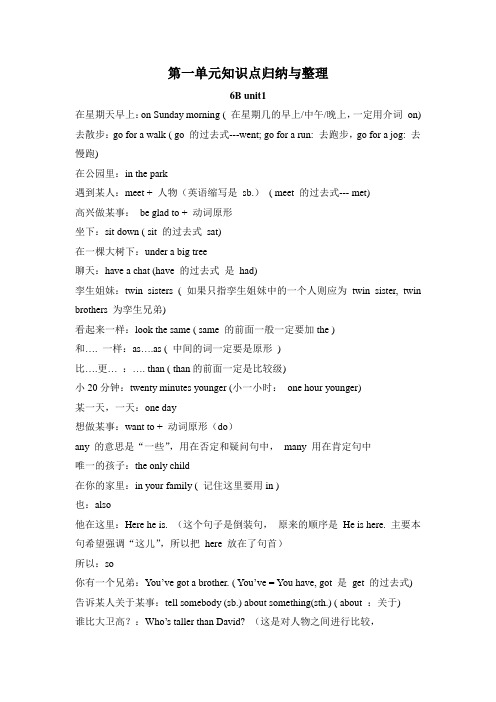
第一单元知识点归纳与整理6B unit1在星期天早上:on Sunday morning ( 在星期几的早上/中午/晚上,一定用介词on) 去散步:go for a walk ( go 的过去式---went; go for a run: 去跑步,go for a jog: 去慢跑)在公园里:in the park遇到某人:meet + 人物(英语缩写是sb.)( meet 的过去式--- met)高兴做某事:be glad to + 动词原形坐下:sit down ( sit 的过去式sat)在一棵大树下:under a big tree聊天:have a chat (have 的过去式是had)孪生姐妹:twin sisters ( 如果只指孪生姐妹中的一个人则应为twin sister, twin brothers 为孪生兄弟)看起来一样:look the same ( same 的前面一般一定要加the )和…. 一样:as….as ( 中间的词一定要是原形)比….更…:…. than ( than的前面一定是比较级)小20分钟:twenty minutes younger (小一小时:one hour younger)某一天,一天:one day想做某事:want to + 动词原形(do)any 的意思是“一些”,用在否定和疑问句中,many 用在肯定句中唯一的孩子:the only child在你的家里:in your family ( 记住这里要用in )也:also他在这里:Here he is. (这个句子是倒装句,原来的顺序是He is here. 主要本句希望强调“这儿”,所以把here 放在了句首)所以:so你有一个兄弟:You’ve got a brother. ( You’ve = You have, got 是get 的过去式) 告诉某人关于某事:tell somebody (sb.) about something(sth.) ( about :关于)谁比大卫高?:Who’s taller than David? (这是对人物之间进行比较,句型为:Who’s +比较级+ than…? 回答是:人称代词+ is )谁的书包更重,你的还是我的?:Whose school bag is heavier,yours or mine?看到句中有or, 前面一句话里的形容词或副词就要用比较级;句型为:Whose …. is + 比较级,… or…? 回答是:名词性物主代词+ is. /名词所有格+ is. yours 和mine 是名词性物主代词,名词性物主代词一定单独使用,后面不再跟名词。
牛津小学英语六年级6B知识点汇总
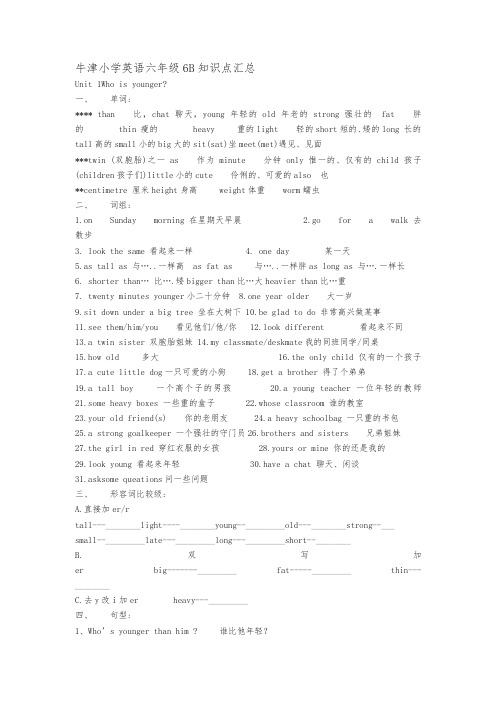
牛津小学英语六年级6B知识点汇总Unit 1Who is younger?一、单词:**** than 比,chat聊天,young年轻的old年老的strong 强壮的fat 胖的thin 瘦的heavy 重的light 轻的short短的、矮的long 长的tall高的small小的big大的sit(sat)坐meet(met)遇见、见面***twin (双胞胎)之一as 作为minute 分钟only惟一的、仅有的child孩子(children孩子们)little小的cute 伶俐的、可爱的also 也**centimetre 厘米height身高 weight体重worm蠕虫二、词组:1.on Sunday morning 在星期天早晨2.go for a walk 去散步3. look the same 看起来一样4. one day 某一天5.as tall as 与…..一样高as fat as 与…..一样胖as long as 与….一样长6. shorter than…比….矮bigger than比…大heavier than比…重7. twenty minutes younger小二十分钟 8.one year older 大一岁9.sit down under a big tree 坐在大树下 10.be glad to do 非常高兴做某事11.see them/him/you 看见他们/他/你 12.look different 看起来不同13.a twin sister 双胞胎姐妹 14.my classmate/deskmate我的同班同学/同桌15.how old 多大16.the only child 仅有的一个孩子17.a cute little dog一只可爱的小狗 18.get a brother 得了个弟弟19.a tall boy 一个高个子的男孩 20.a young teacher 一位年轻的教师21.some heavy boxes 一些重的盒子 22.whose classroom 谁的教室23.your old friend(s) 你的老朋友 24.a heavy schoolbag 一只重的书包25.a strong goalkeeper 一个强壮的守门员26.brothers and sisters 兄弟姐妹27.the girl in red 穿红衣服的女孩 28.yours or mine 你的还是我的29.look young 看起来年轻 30.have a chat 聊天、闲谈31.asksome queations问一些问题三、形容词比较级:A.直接加er/rtall---________light----________young--_________old---________strong--___ small--_________late---_________long---_________short--________B.双写加er big-------_________ fat-----_________ thin---________C.去y改i加er heavy---_________四、句型:1、Who’s younger than him ?谁比他年轻?My brother is younger than him . 我弟弟比他年轻。
牛津上海版英语六年级第一学期 Unit6 —— Unit10 语言点归纳
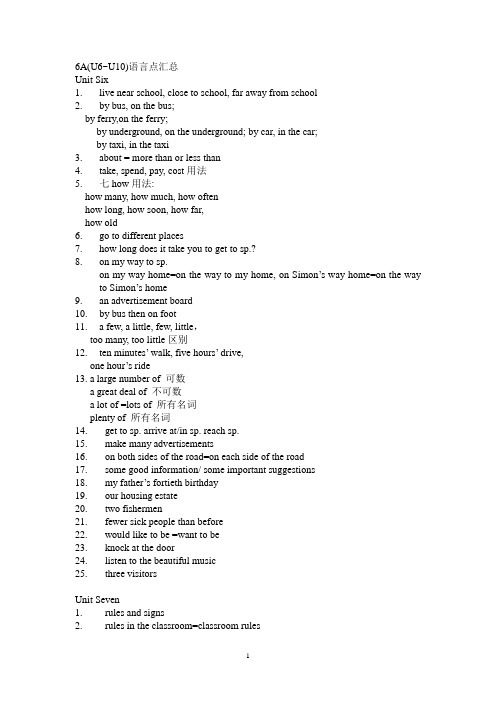
6A(U6~U10)语言点汇总Unit Six1.live near school, close to school, far away from school2.by bus, on the bus;by ferry,on the ferry;by underground, on the underground; by car, in the car;by taxi, in the taxi3.about = more than or less than4.take, spend, pay, cost用法5.七how用法:how many, how much, how oftenhow long, how soon, how far,how old6.go to different places7.how long does it take you to get to sp.?8.on my way to sp.on my way home=on the way to my home, on Simon’s way home=on the way to Simon’s home9.an advertisement board10.by bus then on foot11. a few, a little, few, little,too many, too little区别12.ten minutes’ walk, five hours’ drive,one hour’s ride13. a large number of 可数a great deal of 不可数a lot of =lots of 所有名词plenty of 所有名词14.get to sp. arrive at/in sp. reach sp.15.make many advertisements16.on both sides of the road=on each side of the road17.some good information/ some important suggestions18.my father’s fortieth birthday19.our housing estate20.two fishermen21.fewer sick people than before22.would like to be =want to be23.knock at the door24.listen to the beautiful music25.three visitorsUnit Seven1.rules and signs2.rules in the classroom=classroom rules3.rules in the library= library rules4.rules in the park=park rules]5.rules in the street/on the road=traffic rules6.walk on the grass7.leave rubbish8.not eat or drink9.wait for the green man10.keep quiet11.listen to our teachers carefully12.draw on our desks13.walk across the road= cross the road14.pick the flowers, pick up the rubbish15.turn left/right=turn to the left/right16.talk loudly17.in the shopping center18.an escalator19.enter the centre20.on the right of sth. On the left of sth.e the one on the left/ in the middle22.obey/keep/follow the rules, break the rules23.chase each other24.be late for school25.go upstairs/downstairs=go up/down the stairs26.at the crossing27.at the entrance to sp.28.What’s the meaning of this word=What does this word mean?29.enter the room=go into the room30.at the traffic lights31.decide to do sth32.write an invitation to sb33.look for sth to eat34.tell lies35.be angry with sb/ be angry at sth36.anger/angry, hunger/hungry37.see leaves falling from the trees38.see sb doing sth, hear sb doing sth39.on Children’s Day40.be friendly/kind to sbUnit Eight1.would like sth for dinner2.steamed food/ fried food/ boiled food/ baked food3.steamed prawns with garlic4.tomato and egg soup5.fried eggs with bacon6.have some fruit7.need to do sth, don’t need to do sth, don’t have to do sth, needn’t do sth; don’tneed anything8.fried cabbage9.fried chicken wings10.steamed fish11.chicken soup12.steamed eggs with meat13.boiled eggs14.the prices of food15. a high/low price,a big/small vocabulary16.at the fish/vegetable/fruit/meat stall in the market17.in the fish/vegetable/fruit/meat section in the supermarket18.make a shopping list19.find the cheaper items20. the cheapest=the least expensivethe dearest= the most expensive21.frozen food, freezing weather22.How much is it?=How much does it cost?23.How much are they?=How much do they cost?24.play the role of sb25.my favorite food is sth.= I like sth best.26.baked potatoes27.what do you think of sth=how do you like sth? 回答要用形容词28.different kinds of food29. fruit salad30. buy some food for this activity31. some pieces of bread32. receive some invitations from sb33. take some photos34. in the hall35. on Sunday afternoonUnit Nine1.What fun it is to do sth!=How interesting it is to do sth2.picnics are fun3.plan for sth, plan to do sth4.have a picnic5.Shall we do sth? That’s a good idea.6.soft drinks7.have some apple juice and some cola8.buy some meat9. a bottle of jam10. a packet of chicken wings11.Bread tastes nice with jam.12.buy some snacks13.have a packet of nuts14.sweet,sour,bitter,spicy,salty15.spicy sausages16.like/dislike, fresh/unfresh17.prepare for a picnic/ get ready for a picnic18.get enough money19.May I have sth, please? OK. Here you are.20.Would you like sth?Yes, please./No, thanks.21.thinner than before22.fatter than before23.it’s time for sth/ it’s time to do sth24.visit the History Museum25.What’s the weather like today?= How is the weather、26.sometimes有时候, some times数次,sometime next week下周的某个时候, for some time一段时间27.know about sth= understand sth28.on weekdays= at weedends29.That’s what I’m going to do.30.join the club,join in the match=take part in the matchattend the meeting/ wedding ceremony31.enjoy themselves= have a good time32.speak English, say it in EnglishUnit Ten1.have a healthy/an unhealthy diet=have a healthy/an unhealthy eating habit2.look at the food pyramid3.show sb sth=show sth to sb4.give sb sth=give sth to sb5.make sb sth=make sth for sb6.buy sb sth= buy sth for sb7. a little fat, salt and sugar8.some milk eggs and yogurt9.some meat chicken and fish10.plenty of fresh fruit and vegetables11. a lot of rice, noodles and bread12.live in the countryside/city13.fat and unhealthy/ fit and healthy14.He doesn’t do any exercise.=He does no exercise.= He never do any exercise.15.do exercise做锻炼16.do exercises做练习题17.morning exercises/eye exercises早操/眼操18.go to visit sb.19.have lunch with sb20.share lunch with sb21.some pizza and chips22.that kind of food23.stay with sb24.work in sb’s garden25.五个变得go wrong, get angry, grow tall, become fat, turn green五个上去look,smell,taste,sound,feel26.have sth for meals28. My favorite breakfast is eggs and milk.= Eggs and milk are my favorite breakfast.29. have some porridge30. steamed chicken with rice31. some vegetable soup32. have a little tea33. healthier than, less healthy than, as healthy as, as unhealthy as34. a quiz about sth.35. watch TV/talk when you eat = watch TV when eating36. wash your hands before you eat = wash your hands before eating37.brush your teeth before you go to bed= brush your teeth before going to bed38.get right/wrong39.score in the quiz40.should do sth/ shouldn’t do sth41.less beautiful than42. too much spicy food43. at the bakery44. a large number of activities45. enjoy doingfinish doingpractice doing46.throw rubbish into the river47. talk with sb on the phone48. stop doing /to do49. only a little/few50.try my best to do sth51.keep your bedroom clean52.travel by air53. ask sb to do sth54. help sb do sth, help sb with sth55.the departure time56. on the ninth floor57. in all= altogether58. soon= in no time59. in the past60. traffic jams拓展知识点:1.talk about sth with sb at supper2.What important water is in our life13.There will be/There is going to be4.an 18-year-old student, a ten-year-old boy5.live alone, feel lonely6.cross the road quickly7.something important,8.nothing necessary9.also, too, either10.tell them to do sth, tell them not to do sth,11.ask sb to do sth, ask sb not to do sth12.already, yet, just13.be born in summer/in 1998/in November/ in Shanghai/ on November2214.My job is to do sth./ My hope is to do sth./ My wish is to do sth/ My hobby is doing sth15.teach them PE16.It’s time for sth. It’s time for sb to do sth17.too much frozen food18.stop polluting the land19.even worse than20.Help yourselves to some fish, boys and girls,21.Help yourself, Tom.22.talk rudely23. on the fourth day24. fourth, fifth, eighth, ninth, twentieth, ninety-ninth, one hundredth25. plan a visit to sp.26. be good at doing sth27. some more suggestions28.drive me to school29. for two days+现完(How long), in two days +一将(How soon)ago+ 过去时30. How many cartons of milk does she need?31. not as healthy as32. in his one hand, in his other hand,33. one…the other, some… others.34.have a beautiful voice, loud noise,35.how often 问频率,every two weeks36. listen to the pop music37.continue to do sth/ continue doing sth38.any other + 名单(同一范围)Tokyo is larger than any other city in Japan.39. any + 名单(不同范围)Tokyo is larger than any city in Zhejiang.41.Why not do sth.42.too much+不可数名词,much too+形容词副词43.had better do sth. /had better not do sth44.one of the longest rivers45.to their disappointment46.how to talk to foreigners47.both A and B, neither A nor Blions of / thousands of / hundreds of49.three million, five thousand, eight hundred50.YaoMing is too tall to enter our classroom.= YaoMing is so tall that he can’tenter our classroom.51.LiuXiang runs fast enough to win the prize.= LiuXiang runs so fast that he canwin the prize.52.反意疑问句中如有few, little, seldom, scarcely, hardly, never, not等否定半否定词须在反意疑问部分中用肯定形式。
牛津译林6B第六单元知识点汇总
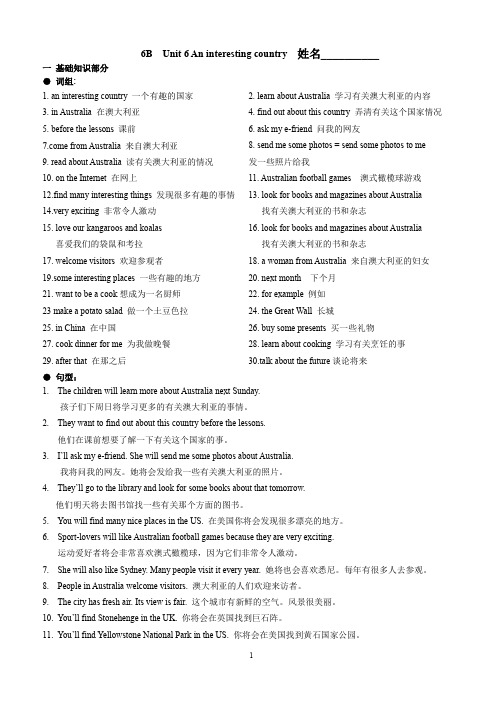
6B Unit 6 An interesting country 姓名__________一基础知识部分●句型:1.The children will learn more about Australia next Sunday.孩子们下周日将学习更多的有关澳大利亚的事情。
2.They want to find out about this country before the lessons.他们在课前想要了解一下有关这个国家的事。
3.I’ll ask my e-friend. She will send me some photos about Australia.我将问我的网友。
她将会发给我一些有关澳大利亚的照片。
4.They’ll go to the library and look for some books about that tomorrow.他们明天将去图书馆找一些有关那个方面的图书。
5.You will find many nice places in the US. 在美国你将会发现很多漂亮的地方。
6.Sport-lovers will like Australian football games because they are very exciting.运动爱好者将会非常喜欢澳式橄榄球,因为它们非常令人激动。
7.She will also like Sydney. Many people visit it every year. 她将也会喜欢悉尼。
每年有很多人去参观。
8.People in Australia welcome visitors. 澳大利亚的人们欢迎来访者。
9.The city has fresh air. Its view is fair. 这个城市有新鲜的空气。
风景很美丽。
10.You’ll find Stonehenge in the UK. 你将会在英国找到巨石阵。
江苏牛津译林版 6B Unit6 重点知识的归纳
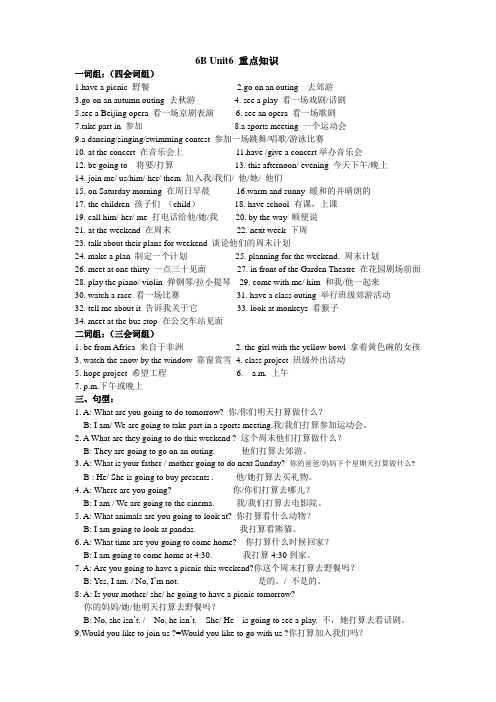
6B Unit6 重点知识一词组:(四会词组)1.have a picnic 野餐2.go on an outing 去郊游3.go on an autumn outing 去秋游4. see a play 看一场戏剧/话剧5.see a Beijing opera 看一场京剧表演6. see an opera 看一场歌剧7.take part in 参加8.a sports meeting 一个运动会9.a dancing/singing/swimming contest 参加一场跳舞/唱歌/游泳比赛10. at the concert 在音乐会上11.have /give a concert举办音乐会12. be going to 将要/打算13. this afternoon/ evening 今天下午/晚上14. join me/ us/him/ her/ them 加入我/我们/ 他/她/ 他们15. on Saturday morning 在周日早晨16.warm and sunny 暖和的并晴朗的17. the children 孩子们(child)18. have school 有课,上课19. call him/ her/ me 打电话给他/她/我20. by the way 顺便说21. at the weekend 在周末22. next week 下周23. talk about their plans for weekend 谈论他们的周末计划24. make a plan 制定一个计划25. planning for the weekend. 周末计划26. meet at one thirty 一点三十见面27. in front of the Garden Theatre 在花园剧场前面28. play the piano/ violin 弹钢琴/拉小提琴29. come with me/ him 和我/他一起来30. watch a race 看一场比赛31. have a class outing 举行班级郊游活动32. tell me about it 告诉我关于它33. look at monkeys 看猴子34. meet at the bus stop 在公交车站见面二词组:(三会词组)1. be from Africa 来自于非洲2. the girl with the yellow bowl 拿着黄色碗的女孩3. watch the snow by the window 靠窗赏雪4. class project 班级外出活动5. hope project 希望工程6. a.m. 上午7. p.m.下午或晚上三、句型:1. A: What are you going to do tomorrow? 你/你们明天打算做什么?B: I am/ We are going to take part in a sports meeting.我/我们打算参加运动会。
牛津英语六年级(全年级)重点知识点,句型,单词,短语整理总结
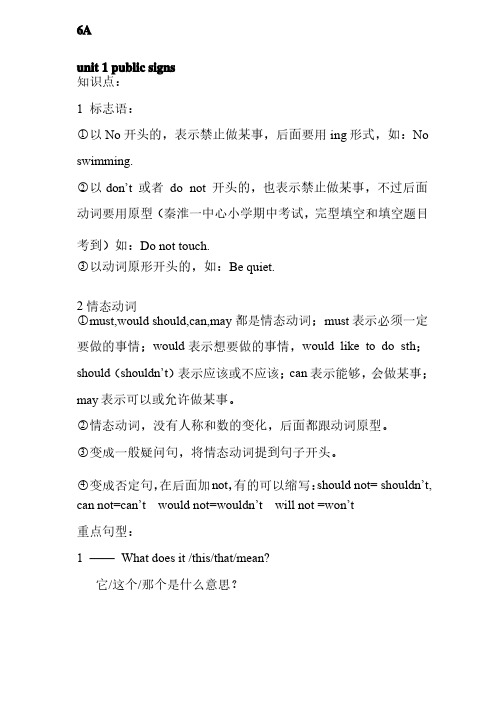
6Aunit 1 public signs知识点:知识点:1 标志语:标志语:○1以No 开头的,表示禁止做某事,后面要用ing 形式,如:No swimming.○2以don don’’t 或者或者do not 开头的,也表示禁止做某事,不过后面动词要用原型(秦淮一中心小学期中考试,完型填空和填空题目考到)如:Do not touch.○3以动词原形开头的,如:Be quiet. 2情态动词情态动词○1must,would should,can,may 都是情态动词;must 表示必须一定要做的事情;would 表示想要做的事情,would like to do sth ;should (shouldn shouldn’’t )表示应该或不应该;can 表示能够,会做某事;may 表示可以或允许做某事。
表示可以或允许做某事。
○2情态动词,没有人称和数的变化,后面都跟动词原型。
情态动词,没有人称和数的变化,后面都跟动词原型。
○3变成一般疑问句,将情态动词提到句子开头。
变成一般疑问句,将情态动词提到句子开头。
○4变成否定句,在后面加not ,有的可以缩写:should not= shouldn should not= shouldn’’t, can not=can can not=can’’t would not=wouldn would not=wouldn’’t will not =won will not =won’’t重点句型:重点句型:1 ————What does it /this/that/mean? 它/这个/那个是什么意思?那个是什么意思?It means you /wemust/should/shoudn It means you /wemust/should/shoudn’’t..意思是你/我们必须/应当/不应该。
解析:解析:当你不知道一个标志、一个词语或者一句话的意思时,可以用这句话来询问。
沪教版六年级英语下册(上海牛津6B)知识点总结
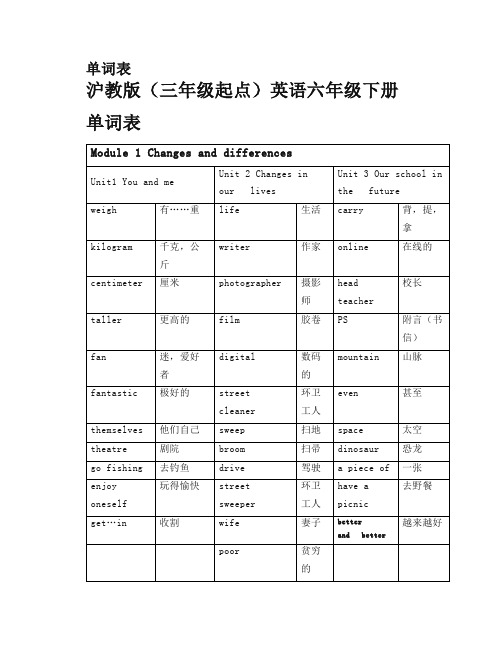
lazy
懒惰的
take off
脱掉
roof
屋顶
yard
院子
hit
碰撞
see the world
见世面
one by one
一个接一个地
look out of
往外看
even
甚至
themselves
他们自己
sweep
扫地
space
太空
theatre
剧院
broom
扫帚
dinosaur
恐龙
go fishing
去钓鱼
drive
驾驶
a piece of
一张
enjoy oneself
玩得愉快
street sweeper
环卫工人
have a picnic
去野餐
get…in
收割
油
craft
手艺,工艺
long race
长跑
oil painting
油画
crown
王冠
short race
短跑
powerful
强有力的
scissors
剪刀
win
获胜
ink
墨水
tape
胶带
long jump
跳远
brush
画笔,刷子
glue
胶水
high jump
跳高
paints
绘画颜料
saw
锯
swimsuit
kilogram
千克,公斤
writer
作家
online
在线的
centimeter
厘米
photographer
上海牛津版英语六年级上册六上6A期末复习Unit6-Unit10U6-U10同步讲义教案
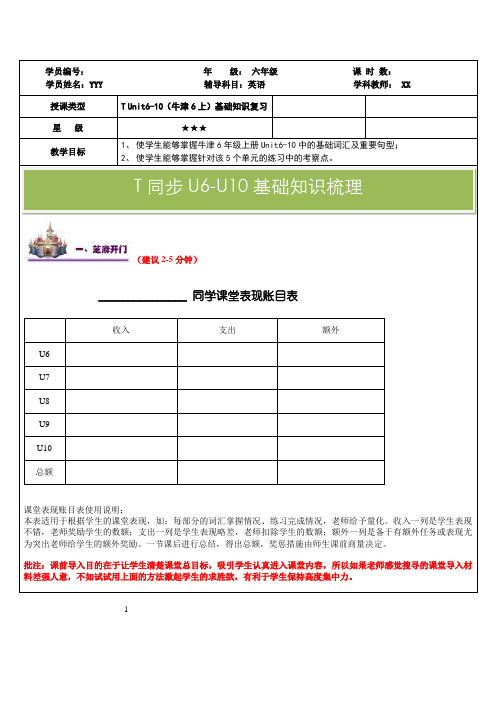
学员编号:年级:六年级课时数:学员姓名:YYY 辅导科目:英语学科教师: XX 授课类型T Unit6-10(牛津6上)基础知识复习星级★★★教学目标1、使学生能够掌握牛津6年级上册Unit6-10中的基础词汇及重要句型;2、使学生能够掌握针对该5个单元的练习中的考察点。
(建议2-5分钟)_______________ 同学课堂表现账目表收入支出额外U6U7U8U9U10总额课堂表现账目表使用说明:本表适用于根据学生的课堂表现,如:每部分的词汇掌握情况、练习完成情况,老师给予量化。
收入一列是学生表现不错,老师奖励学生的数额;支出一列是学生表现略差,老师扣除学生的数额;额外一列是备于有额外任务或表现尤为突出老师给学生的额外奖励。
一节课后进行总结,得出总额,奖惩措施由师生课前商量决定。
批注:课前导入目的在于让学生清楚课堂总目标,吸引学生认真进入课堂内容,所以如果老师感觉搜寻的课堂导入材料差强人意,不如试试用上面的方法激起学生的求胜欲,有利于学生保持高度集中力。
T同步U6-U10基础知识梳理1(建议20-25分钟)一、词汇WordsUnit61. travel v.行走,旅行2. minute n. 分钟3. ferry n. 渡船4. hour n. 小时5. advertisement n. 广告6. board n. 栏,板7. temple n. 庙宇8. light rail 轻轨9. department store 百货商店10. housing estate 居民区11. far away from离……远12. by bus /ferry/ underground乘公共汽车/渡船/地铁13. go to school 去上学14. travelling time 行走时间15. get to the supermarket 到达超市16. a few 几个17. a lot of 许多18. on the bus在公共汽车上批注:1. 复习本单元词汇时,建议老师可以分类让学生看,如:跟交通工具有关的,跟时间有关的,跟生活小区有关的等,方便学生回忆。
牛津6B基础知识汇总

四种时态一:现在进行时—表示现在正在进行或发生的动作。
结构:主语+be动词+动词ing形式(现在分词)e.g. 肯定句:He is watching TV now.否定句:He is not watching TV now.(变为否定句只需在be动词后面加not即可)一般疑问句:Is he watching TV now? (变为一般疑问句只需将be动词提到句首即可)Y es, he is. / No, he isn’t.特殊疑问句:特殊疑问词+be动词+主语+现在分词(简记:特殊疑问词+一般疑问句)对不同的句子成分进行提问:he Who is watching TV?watching TV What is he doing?TV What is he watching?now When is he watching TV?小贴士:be动词:am / is / are特殊疑问词及其用法:what什么what colour什么颜色when何时where哪里who谁whose谁的which哪一个why为什么how怎样how many多少how much多少(钱)how long多长时间how often 多久(问频率)二:一般现在时—表示事物或人物的特征;表示经常性或习惯性发生的动作;表示客观事实。
(1):主语+be动词+其他(结构一)e.g. 肯定句:He is nice.否定句:He is not nice.(变为否定句只需在be动词后面加not即可)一般疑问句:Is he nice?(变为一般疑问句只需将be动词提到句首即可)Y es, he is. / No, he isn’t.特殊疑问句:特殊疑问词+be动词+其它(简记:特殊疑问词+一般疑问句)对不同的句子成分进行提问:he Who is nice?nice How is he?(2):主语+行为动词(结构二)e.g. 肯定句:He watches TV every day.否定句:He doesn’t watch TV every day.(变为否定句只需在动词前加上助动词并对助动词加以否定即可)一般疑问句:Does he watch TV every day?(将助动词放到句首,同时将后面的动词还原成原形即可)Y es, he does. / No, he doesn’t.特殊疑问句:特殊疑问词+助动词+主语+动词原形(简记:特殊疑问词+一般疑问句)对不同的句子成分进行提问:he Who watches TV every day?watch TV What does he do every day?TV What does he watch every day?every day When does he watch TV?小贴士:第三人称单数:he / she / it ;人名(单数);称谓(单数)。
牛津6BUnit6-unit10知识点梳理
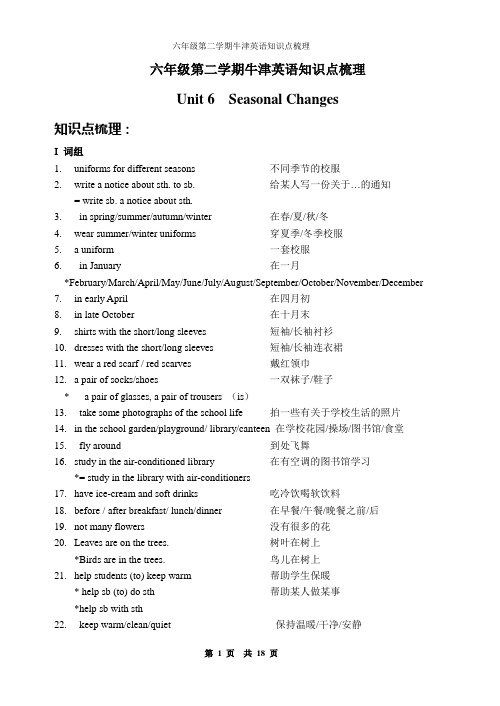
六年级第二学期牛津英语知识点梳理Unit 6 Seasonal Changes知识点梳理:I 词组1.uniforms for different seasons 不同季节的校服2.write a notice about sth. to sb. 给某人写一份关于…的通知= write sb. a notice about sth.3.in spring/summer/autumn/winter 在春/夏/秋/冬4.wear summer/winter uniforms 穿夏季/冬季校服5. a uniform 一套校服6.in January 在一月*February/March/April/May/June/July/August/September/October/November/December7.in early April 在四月初8.in late October 在十月末9.shirts with the short/long sleeves 短袖/长袖衬衫10.dresses with the short/long sleeves 短袖/长袖连衣裙11.wear a red scarf / red scarves 戴红领巾12. a pair of socks/shoes 一双袜子/鞋子* a pair of glasses, a pair of trousers (is)13.take some photographs of the school life 拍一些有关于学校生活的照片14.in the school garden/playground/ library/canteen 在学校花园/操场/图书馆/食堂15.fly around 到处飞舞16.study in the air-conditioned library 在有空调的图书馆学习*= study in the library with air-conditioners17.have ice-cream and soft drinks 吃冷饮喝软饮料18.before / after breakfast/ lunch/dinner 在早餐/午餐/晚餐之前/后19.not many flowers 没有很多的花20.Leaves are on the trees. 树叶在树上*Birds are in the trees. 鸟儿在树上21.help students (to) keep warm 帮助学生保暖* help sb (to) do sth 帮助某人做某事*help sb with sth22.keep warm/clean/quiet 保持温暖/干净/安静23.make snowmen (a snowman)堆雪人II. 词性转换1. seasonal (adj.) -- season (n.)There are four seasons in a year.Strawberries are seasonal fruit.2. change ( n. v. ) -- *changeable (adj.)Please change the sentence into English.Here is your change, sir.The weather is very changeable in Tibet.3. shorts ( n.)--short ( adj.)Boys must wear shorts and T-shirts in summer.In summer, the days are long and the nights are short.可数:*生命save my life *lives (pl.)4. life n.不可数:生活school lifelive (v.)*living adj. (定语) *alive adj. (表语)The farmer and his wife live happily in their hut and they enjoy their happy life very much.The hero who has saved his life is still alive.5. air-conditioned (adj.) air-conditioner (n.)The library isn’t air-conditioned now because there is something wrong with the air-conditioner.III. 语言点/句型1. Boys must wear white shirts with the short sleeves.2. Many flowers grow in the garden.3. Not many students like playing in the playground because it’s hot.Unit 7 Travelling in Garden City知识点梳理:I 词组:1.traveling in Garden City 花园城的出行2.travelling by bus∕ferry∕underground 乘公共汽车/渡船/地铁出行3. a single-decker bus 一辆单层汽车4. a double-decker bus 一辆双层汽车5. a fare box 一个投币箱6. a public transportation card 一张公共交通卡7.an air-conditioned bus 一辆空调车8.in the past 在过去9.in 10 years’ time 十年后10.all passengers 所有的乘客11.buy tickets from 从……买票12.collect money from the passengers 从乘客那里收钱13.have to do sth.(don’t have to do sth.) 不得不;必须(不必)14.put their money in a fare box 把钱放进投币箱e sth. instead 用……替代16.all of 全部的……17.most of 大部分的……18.some of 一些……19.none of 没有一个……20.be like 像……21.fewer traffic jams 少一些交通阻塞22.more underground stations 更多的地铁站23.light rail 轻轨24.traffic lights 交通灯25.car parks 停车场26.discuss sth. with sb. 和…讨论27.*think about 考虑;思考;想一想28.*kinds of transport 交通方式29.*make a poster about 制作一张有关……的海报II. 词性转换1. travel v. 旅行—travelling n. 交通—﹡traveller n. 旅行者e.g. Travelling in Shanghai will be more and more convenient.The Bund attracts many travelers to take photos there.2. conductor n. 售票员—*conduct v. 指挥,进行e.g. The manager asked him to conduct the meeting3. collect v. 收集—collection n. 收集e.g. Mr. Grey is interested in art and he has a large collection of paintings.4. driver n. 司机—drive v. 驾驶e.g. My father drives me to school every day.5. crossing n. 十字路口—cross v. 穿过—across prep. 越过e.g. Don’t cross the road when the traffic light is red.The old lady was walking across the road carefully.6. discuss v. 讨论—discussion n. 讨论e.g. We had a discussion on language and communication7. air-conditioned adj. 有空调设备的—air-conditioner n. 空调e.g. He's going to install an air-conditioner in the house.8. park v. 停车—park n. 公园/停车库e.g. I have to look for a car park to park my car.9. little adj. 很少的—less (比较级) 更少的e.g. He promised to have less fast food to keep healthy.10. few adj. 很少的—fewer (比较级) 更少的e.g. Helen made a few mistakes in her test paper. But Jane made fewer than her.11. many ∕much adj. 许多的—more (比较级) 更多的e.g. Nowadays you can find more tall buildings in Shanghai.III. 语言点/句型1. What will travelling in our city be like in 10 years’ time?=How will travelling in our city be in 10 years’ time?What …be like? …怎么样?be like∕look like 中like prep. 像…一样e.g. Our school is like a garden. like prep. 像…一样She looks like her mother.He likes reading detective stories, like v. 喜欢2. in 10 year s’ time =in 10 years 十年后(常与一般将来时连用)◆in one year’s time◆用How soon 提问e.g. The young man will finish riding around the country in two years’ time.How soon will the young man finish riding around the country?3. there be 句型表示事物的存在在什么地方有什么一般现在时:There is∕are一般过去时:There was∕were一般将来时:There will be/ There is going to be4. all of∕most of∕some of∕none of◆all of∕most of∕some of做主语时,后面的名词为复数,谓语动词也为复数e.g. All of the students wear school uniforms.◆none of做主语时,既可用复数谓语动词,也可用单数谓语动词e.g. None of us enjoy(s) getting up early.﹡复习one of的用法﹡可补充与both of∕either of∕neither of 的比较5. in the past∕nowadays∕in 10 years’ time分别与一般过去时,一般现在时,一般将来时连用e.g. In the past, people usually went to work by bike.Nowadays, people go to work by underground.In 10 years’ time, people will drive to work themselves.6. 比较级:little—less, few—fewer, many∕much—more◆fewer traffic jams∕less traffic7. have to do 不得不◆否定形式:don’t have to do = needn’t do∕don’t need to do 不需要e.g. I have to stay at home. I don’t have to stay at home.◆和must 的区别have to do —强调客观的需要,有人称,时态的变化must —强调主观的意愿,没有人称,时态的变化e.g. He broke his leg, so he had to lie in bed for several days.She must study hard, because she wants to be a doctor.8. perhaps= maybe, possibly 也许,可能9. travel by bus=take a bustravel by underground= take the underground10. instead和instead of◆instead单独用于句首句尾,是副词◆instead of 用于名词,代词或介词短语前e.g. I don’t like the red one, give me the black one instead.= Give me the black one instead of the red one.11. transportation n. (美)= transport n.(英)交通工具12. 动词与介词的搭配buy … from从…买collect … from从…收集put … in把…放入13. a woman driver— five wom e n driver sa man teacher— two m e n teacher s*a girl student — some girl studentsUnit 8 Windy weatherI 词组1.windy weather 有风的天气2.different kinds of 不同种类的3.make a display board 制作一个展板4. a gentle wind 一阵柔和的风5. a strong wind 一阵大风6. a typhoon 一阵台风7.see sb. doing sth 看见某人正做某事8.fly kites in the park 在公园里放风筝9.hold raincoats tightly 紧紧地抓住雨衣10.leaves blow slightly 树叶微微地吹动11.fly in the sky 在空中飞扬12.take flower pots into flats 把花盆拿进房间13.clouds move quickly 云快速地移动14.windsurf on the sea 在海上进行帆板运动15.on a windy day 在一个有风的日子16.fly kites happily 快乐地放风筝17.at first 起先18.blow gently 柔和地吹19.move slowly 缓慢地移动20.become stronger (风)变得更大了21.blow sth. away 吹走某物22.go home immediately 立刻回家23.blow fiercely 猛烈地吹24.fall down 倒下25.sink in the sea 在海里下沉26.pass quickly 快速地经过27.walk carefully in the street 街上小心地行走28.clean the street 清扫街道29.a slide show about typhoons 一个关于台风的幻灯片30.heavy objects 重物31.fall on cars 落在小汽车上32.break windows 打破玻璃窗33.flower pots outside people’s flats 人们屋外的花盆34.big waves in the sea 海里的大浪35.think about 思考;考虑36.may happen 可能发生37.when there is a typhoon 当有台风的时候38.sink ships and boats 沉没船只39.safety rules 安全规则40.stay at home 待在家中41.close all the windows 关闭所有的窗42.park cars in car parks把汽车停在停车场里43.fishing boats 渔船44.stay in typhoon shelters 待在台风庇护所里II. 词性转换1. windy a. 有风的wind n. 风windy weather/ days a gentle/ strong wind2. gentle a. 温和的gently ad. 温和地He is a gentle person.She gave me a gentle push.3. tightly ad. 紧紧地tight a. 紧紧的She kept her eyes tightly closed.You must hold the bottle tightly.4. slightly ad. 轻微地slight a. 轻微的The leaves blow slightly in the parksI know about him slightly.5. cleaner n. 清洁工人clean a. 干净的v. 清洁They saw some street cleaners cleaning the street.6. happily ad. 愉快地happy a. 快乐的happiness n. 快乐Kitty and Ben flew their kite happily.John lives happily because he always uses his time well for study.7. slowly ad. 缓慢地slow a. 缓慢的The clouds moved slowlyThe sky changed slowly from blue to red.反义quickly/ fast ad. 迅速地8. quickly ad. 迅速地quick a. 迅速的The clouds moved quickly.9. immediately ad. 立即immediate a. 立即的Kitty and Ben went home immediately.Stop smoking immediately.10. fiercely ad. 猛烈地fierce a. 猛烈的The wind became a typhoon and blew fiercely.11. carefully ad. 小心地careful a. 小心的,仔细的*care n./ v. 关心Please listen carefully and write down the sentences.反义carelessly ad. 不注意地,粗心地12. heavy a. 沉重的heavily ad. 沉重地13. safety n. 安全safe a. 安全的*safely ad. 安全地safety rulesmake our city a safe placearrive at home safely14. inside(反义)—outside15. fish n. 鱼v. 捕鱼fisherman ( fishermen) n.(复数) 渔民III. 语言点/句型1. What can you see when there is a gentle wind?有微风的日子里你能看到些什么?when,连词,意为―当……时‖ ,引导时间状语从句。
上海版牛津英语六年级下册6B重点知识点复习整理

上海版牛津英语六年级下册6B 重点知识点复习整理Module 1 City LifeUnit 1 Great cities in Asia【知识点梳理】1.方位词: east / west / north / south / north-east / north-west / south-east / south-west用法: a. 两地不相邻 : e.g. A is north B.(=to the south of)b.两地接壤 : e.g. A is on the north of B.c.所属关系, A 包含 B, B 属于 A: e.g. B is in the north of A.2.by + 交通工具表示“乘 ,, 交通工具” , 用 how 进行提问e.g. by bus / ferry / train / ship / underground by plane = by air,⋯by ship = by sea3.How far ⋯多远(询问距离的远近,路程的长短)e.g. Hoe far is it from your home to school? 从你家到学校有多远?4.How long ⋯多长,多久(询问时间的长短,提问一段时间)e.g. How long does it take to travel from Shanghai to Beijing by train?坐火车从上海到北京要花多长时间?5. It takes (sb.) some time to do sth.做某事需要花费多少时间e.g. It takes me five hours to make this modal plane.做这个模型飞机花了我 5 个小时。
6.like / love / enjoy doing sth. 喜欢做某事e.g. The people in Bangkok like / love / enjoy eating spicy food. 曼谷人喜欢吃辛辣食物。
牛津小学英语6A各单元 知识梳理
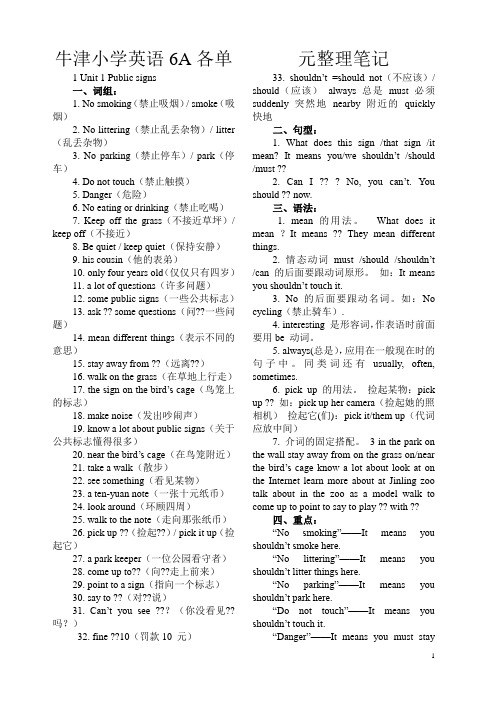
牛津小学英语6A各单元整理笔记1 Unit 1 Public signs一、词组:1. No smoking(禁止吸烟)/ smoke(吸烟)2. No littering(禁止乱丢杂物)/ litter (乱丢杂物)3. No parking(禁止停车)/ park(停车)4. Do not touch(禁止触摸)5. Danger(危险)6. No eating or drinking(禁止吃喝)7. Keep off the grass(不接近草坪)/ keep off(不接近)8. Be quiet / keep quiet(保持安静)9. his cousin(他的表弟)10. only four years old(仅仅只有四岁)11. a lot of questions(许多问题)12. some public signs(一些公共标志)13. ask ?? some questions(问??一些问题)14. mean different things(表示不同的意思)15. stay away from ??(远离??)16. walk on the grass(在草地上行走)17. the sign on the bird’s cage(鸟笼上的标志)18. make noise(发出吵闹声)19. know a lot about public signs(关于公共标志懂得很多)20. near the bird’s cage(在鸟笼附近)21. take a walk(散步)22. see something(看见某物)23. a ten-yuan note(一张十元纸币)24. look around(环顾四周)25. walk to the note(走向那张纸币)26. pick up ??(捡起??)/ pick it up(捡起它)27. a park keeper(一位公园看守者)28. come up to??(向??走上前来)29. point to a sign(指向一个标志)30. say to ??(对??说)31. Can’t you see ???(你没看见??吗?)32. fine ??10(罚款10 元)33. shouldn’t =should not(不应该)/ should(应该)always 总是must 必须suddenly 突然地nearby 附近的quickly 快地二、句型:1. What does this sign /that sign /it mean? It means you/we shouldn’t /should /must ??2. Can I ?? ? No, you can’t. You should ?? now.三、语法:1. mean 的用法。
牛津6B知识点

牛津6B知识点Module1 Unit1 Fire词汇:cooked meat熟肉 some more再来一点 wood-wooden 木制的Stone Age People 石器时代人们 millions of years ago百万年前 on earth在世界上 hot-heat热量in the cave在山洞里 throw...into 把...扔进 the fire danger火险be in danger处于危险中 danger-dangerous fire-safety消防安全save拯救-safe(形)-safely(副)-safety(名) care-careful小心的careless 粗心的 look after=take care of 照看 post-poster海报play with matches 玩火柴 what else=what other things其它的什么事without doing不用做某事 run out of 从...跑出fire rules消防规则 pack your school bag整理书包take..from从..带走camp-fire营火fight-fought-fought战斗drop-dropped-dropped throw-threw-thrown take-took-taken still仍然extreme最大的 cigarette香烟 helicopter直升飞机句子:1.It tastes nice. How does it taste?2.Do you know who cooked food first?3.She cooks with charcoal.4.She likes gas better than electricity.=She prefers gas to electricity. 比起电,她更喜欢煤气。
沪教版英语6B单元知识梳理【范本模板】

上海牛津版6B英语课本知识点梳理课本知识梳理U1单词亚洲Asian 亚洲人亚洲人的亚洲的2.Japan 日本Japanese 日本人日本人的日本的3.north—east 东北north—west 西北south—east东南south-west西北4.Capital the capital city of Shandong province 山东的省会城市5.Exhibition 名词展览会exhibit 动词展览rmation inform动词告知通知7.Palace place 注意区别Summer Palace 颐和园8.Tourist tour 名词和动词旅游our guide 导游visitor 参观者passenger 乘客9.Kilometer kilogram公斤千克centimeter 厘米meter 米lion thousand千hundred百billion 十亿millions of 好几百万的 3million 三百万11.Building build动词build a house 建房子12.Huge large big 大13.Famous well—known 同义词形容词有名的fame 名词名声名誉词组名词词组1.great cities in Asia 亚洲的大城市city cities 变复数区分trolleys2.different cities 不同的城市3.the capital of 。
.的首都。
的省会城市the capital city of4.which city 哪个城市?5.other places 其他的地方other 后加可数名词复数other students 其他的学生6.another place 另外一个地方another 后加可数名词单数another student另外一个学生7.the table above 上面的表格8.some information about information不可数不加s 关于什么的消息9.the Great Wall 长城the不能省略专有名词首字母要大写10.15 million people 一千五百万人数字加million 不加s11. a lot of tall buildings 很多高楼buildings 不要忘记加s12.huge department stores 大型百货商店13.famous hotels 著名宾馆14.spicy food 辛辣食物15.beautiful beaches 漂亮的海滩16.quiz card 测试卡17.one and a half hours one hour and a half 一个半小时注意an hourand a half 关于几个半都是五个单词可数名词的复数的位置不同而已动词词组18.look at the map 看地图19.travel to sp go to sp 去某地20.ask and answer the questions 问答问题21.read some information about 阅读关于.。
上海牛津英语6B知识点梳理

上海牛津英语6B知识点梳理Module 1 City lifeUnit1 Great cities in Asia知识点梳理:I 词组1. at an exhibition 在展览会上2. the capital of China 中国的首都the capital city of Shandong province 的省会城市3. north-east of Shanghai 在上北面east/ west/ south / north of 在……的东、西、南、北面north-east /north-west of 在……的东北、西北south-east /south- west of 在……东南,西南* in/on/to the east ofeg. Shanghai is in the east of China.Korea is on the east of China.Japan is to the east of China.3. how far 多远4. how 如何/怎样5. how long 多久6. in the past 在过去7. other places 其他城市8. from shanghai to Beijing 从到9. read some information about Beijing 阅读关于的信息10. the Great Wall 长城* the Summer Palace 颐和园* the Palace Museum 故宫博物院11. more than= over 超过* less than = under 少于12. 15 million people 一千五百万人*millions of, thousands of13. huge department store 大型百货公司*huge= very big14. spicy food 辣的食物15. in Asia 在亚洲Asia亚洲 Asian 亚洲人亚洲人的亚洲的16. great cities= big cities 大城市17. which city 哪个城市18. by plane=by air; 乘飞机by ship=by sea; 乘船by train/ ferry 乘火车/ 渡轮19. That’s right. 对的。
牛津英语六年下册第六单元知识点归纳与整理
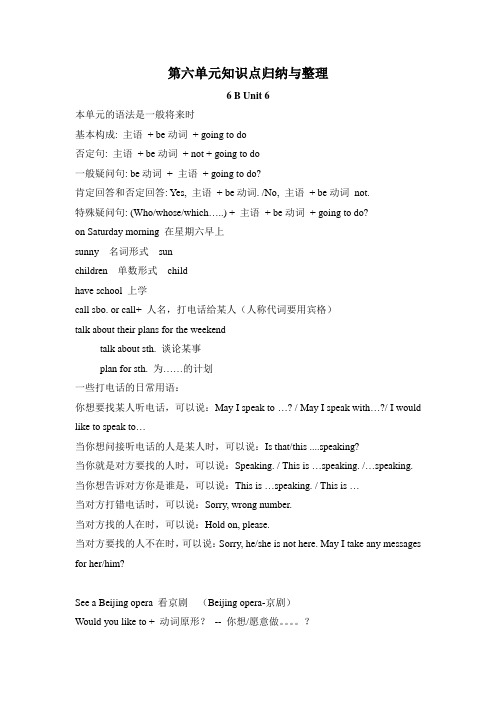
第六单元知识点归纳与整理6 B Unit 6本单元的语法是一般将来时基本构成: 主语+ be动词+ going to do否定句: 主语+ be动词+ not + going to do一般疑问句: be动词+ 主语+ going to do?肯定回答和否定回答: Yes, 主语+ be动词. /No, 主语+ be动词not.特殊疑问句: (Who/whose/which…..) + 主语+ be动词+ going to do?on Saturday morning 在星期六早上sunny 名词形式sunchildren 单数形式childhave school 上学call sbo. or call+ 人名,打电话给某人(人称代词要用宾格)talk about their plans for the weekendtalk about sth. 谈论某事plan for sth. 为……的计划一些打电话的日常用语:你想要找某人听电话,可以说:May I speak to …? / May I speak with…?/ I would like to speak to…当你想问接听电话的人是某人时,可以说:Is that/this ....speaking?当你就是对方要找的人时,可以说:Speaking. / This is …speaking. /…speaking. 当你想告诉对方你是谁是,可以说:This is …speaking. / This is …当对方打错电话时,可以说:Sorry, wrong number.当对方找的人在时,可以说:Hold on, please.当对方要找的人不在时,可以说:Sorry, he/she is not here. May I take any messages for her/him?See a Beijing opera 看京剧(Beijing opera-京剧)Would you like to + 动词原形?-- 你想/愿意做。
广州牛津小学英语六年级6B知识点汇总
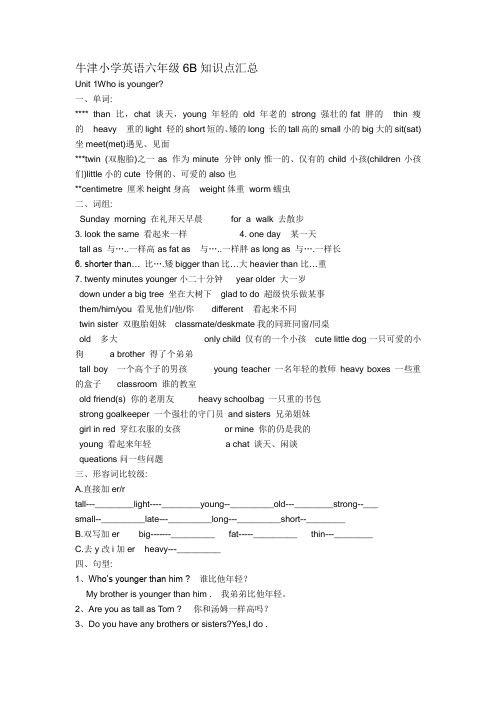
牛津小学英语六年级6B知识点汇总Unit 1Who is younger?一、单词:**** than 比,chat谈天,young年轻的old年老的strong 强壮的 fat 胖的 thin 瘦的 heavy 重的light 轻的short短的、矮的long 长的tall高的small小的big大的sit(sat)坐meet(met)遇见、见面***twin (双胞胎)之一as 作为minute 分钟only惟一的、仅有的child小孩(children小孩们)little小的cute 伶俐的、可爱的also 也**centimetre 厘米height身高weight体重 worm蠕虫二、词组:Sunday morning 在礼拜天早晨 for a walk 去散步3. look the same 看起来一样4. one day 某一天tall as 与…..一样高 as fat as 与…..一样胖as long as 与….一样长6. shorter than… 比….矮bigger than比…大heavier than比…重7. twenty minutes younger小二十分钟year older 大一岁down under a big tree 坐在大树下glad to do 超级快乐做某事them/him/you 看见他们/他/你different 看起来不同twin sister 双胞胎姐妹classmate/deskmate我的同班同窗/同桌old 多大only child 仅有的一个小孩cute little dog一只可爱的小狗 a brother 得了个弟弟tall boy 一个高个子的男孩young teacher 一名年轻的教师heavy boxes 一些重的盒子classroom 谁的教室old friend(s) 你的老朋友heavy schoolbag 一只重的书包strong goalkeeper 一个强壮的守门员and sisters 兄弟姐妹girl in red 穿红衣服的女孩or mine 你的仍是我的young 看起来年轻 a chat 谈天、闲谈queations问一些问题三、形容词比较级:A.直接加er/rtall---________light----________young--_________old---________strong--___small--_________late---_________long---_________short--________B.双写加er big-------_________ fat-----_________ thin---________C.去y改i加er heavy---_________四、句型:1、Who’s younger than him ?谁比他年轻?My brother is younger than him . 我弟弟比他年轻。
- 1、下载文档前请自行甄别文档内容的完整性,平台不提供额外的编辑、内容补充、找答案等附加服务。
- 2、"仅部分预览"的文档,不可在线预览部分如存在完整性等问题,可反馈申请退款(可完整预览的文档不适用该条件!)。
- 3、如文档侵犯您的权益,请联系客服反馈,我们会尽快为您处理(人工客服工作时间:9:00-18:30)。
六年级第二学期牛津英语知识点梳理Unit 6 Seasonal Changes知识点梳理:I 词组1.uniforms for different seasons 不同季节的校服2.write a notice about sth. to sb. 给某人写一份关于…的通知= write sb. a notice about sth.3.in spring/summer/autumn/winter 在春/夏/秋/冬4.wear summer/winter uniforms 穿夏季/冬季校服5. a uniform 一套校服6.in January 在一月*February/March/April/May/June/July/August/September/October/November/December7.in early April 在四月初8.in late October 在十月末9.shirts with the short/long sleeves 短袖/长袖衬衫10.dresses with the short/long sleeves 短袖/长袖连衣裙11.wear a red scarf / red scarves 戴红领巾12. a pair of socks/shoes 一双袜子/鞋子* a pair of glasses, a pair of trousers (is)13.take some photographs of the school life 拍一些有关于学校生活的照片14.in the school garden/playground/ library/canteen 在学校花园/操场/图书馆/食堂15.fly around 到处飞舞16.study in the air-conditioned library 在有空调的图书馆学习*= study in the library with air-conditioners17.have ice-cream and soft drinks 吃冷饮喝软饮料18.before / after breakfast/ lunch/dinner 在早餐/午餐/晚餐之前/后19.not many flowers 没有很多的花20.Leaves are on the trees. 树叶在树上*Birds are in the trees. 鸟儿在树上21.help students (to) keep warm 帮助学生保暖* help sb (to) do sth 帮助某人做某事*help sb with sth22.keep warm/clean/quiet 保持温暖/干净/安静23.make snowmen (a snowman)堆雪人II. 词性转换1. seasonal (adj.) -- season (n.)There are four seasons in a year.Strawberries are seasonal fruit.2. change ( n. v. ) -- *changeable (adj.)Please change the sentence into English.Here is your change, sir.The weather is very changeable in Tibet.3. shorts ( n.)--short ( adj.)Boys must wear shorts and T-shirts in summer.In summer, the days are long and the nights are short.可数:*生命save my life *lives (pl.)4. life n.不可数:生活school lifelive (v.)*living adj. (定语) *alive adj. (表语)The farmer and his wife live happily in their hut and they enjoy their happy life very much.The hero who has saved his life is still alive.5. air-conditioned (adj.) air-conditioner (n.)The library isn’t air-conditioned now because there is something wrong with the air-conditioner.III. 语言点/句型1. Boys must wear white shirts with the short sleeves.2. Many flowers grow in the garden.3. Not many students like playing in the playground because it’s hot.Unit 7 Travelling in Garden City知识点梳理:I 词组:1.traveling in Garden City 花园城的出行2.travelling by bus∕ferry∕underground 乘公共汽车/渡船/地铁出行3. a single-decker bus 一辆单层汽车4. a double-decker bus 一辆双层汽车5. a fare box 一个投币箱6. a public transportation card 一张公共交通卡7.an air-conditioned bus 一辆空调车8.in the past 在过去9.in 10 years’ time 十年后10.all passengers 所有的乘客11.buy tickets from 从……买票12.collect money from the passengers 从乘客那里收钱13.have to do sth.(don’t have to do sth.) 不得不;必须(不必)14.put their money in a fare box 把钱放进投币箱e sth. instead 用……替代16.all of 全部的……17.most of 大部分的……18.some of 一些……19.none of 没有一个……20.be like 像……21.fewer traffic jams 少一些交通阻塞22.more underground stations 更多的地铁站23.light rail 轻轨24.traffic lights 交通灯25.car parks 停车场26.discuss sth. with sb. 和…讨论27.*think about 考虑;思考;想一想28.*kinds of transport 交通方式29.*make a poster about 制作一张有关……的海报II. 词性转换1. travel v. 旅行—travelling n. 交通—﹡traveller n. 旅行者e.g. Travelling in Shanghai will be more and more convenient.The Bund attracts many travelers to take photos there.2. conductor n. 售票员—*conduct v. 指挥,进行e.g. The manager asked him to conduct the meeting3. collect v. 收集—collection n. 收集e.g. Mr. Grey is interested in art and he has a large collection of paintings.4. driver n. 司机—drive v. 驾驶e.g. My father drives me to school every day.5. crossing n. 十字路口—cross v. 穿过—across prep. 越过e.g. Don’t cross the road when the traffic light is red.The old lady was walking across the road carefully.6. discuss v. 讨论—discussion n. 讨论e.g. We had a discussion on language and communication7. air-conditioned adj. 有空调设备的—air-conditioner n. 空调e.g. He's going to install an air-conditioner in the house.8. park v. 停车—park n. 公园/停车库e.g. I have to look for a car park to park my car.9. little adj. 很少的—less (比较级) 更少的e.g. He promised to have less fast food to keep healthy.10. few adj. 很少的—fewer (比较级) 更少的e.g. Helen made a few mistakes in her test paper. But Jane made fewer than her.11. many ∕much adj. 许多的—more (比较级) 更多的e.g. Nowadays you can find more tall buildings in Shanghai.III. 语言点/句型1. What will travelling in our city be like in 10 years’ time?=How will travelling in our city be in 10 years’ time?What …be like? …怎么样?be like∕look like 中like prep. 像…一样e.g. Our school is like a garden. like prep. 像…一样She looks like her mother.He likes reading detective stories, like v. 喜欢2. in 10 year s’ time =in 10 years 十年后(常与一般将来时连用)◆in one year’s time◆用How soon 提问e.g. The young man will finish riding around the country in two years’ time.How soon will the young man finish riding around the country?3. there be 句型表示事物的存在在什么地方有什么一般现在时:There is∕are一般过去时:There was∕were一般将来时:There will be/ There is going to be4. all of∕most of∕some of∕none of◆all of∕most of∕some of做主语时,后面的名词为复数,谓语动词也为复数e.g. All of the students wear school uniforms.◆none of做主语时,既可用复数谓语动词,也可用单数谓语动词e.g. None of us enjoy(s) getting up early.﹡复习one of的用法﹡可补充与both of∕either of∕neither of 的比较5. in the past∕nowadays∕in 10 years’ time分别与一般过去时,一般现在时,一般将来时连用e.g. In the past, people usually went to work by bike.Nowadays, people go to work by underground.In 10 years’ time, people will drive to work themselves.6. 比较级:little—less, few—fewer, many∕much—more◆fewer traffic jams∕less traffic7. have to do 不得不◆否定形式:don’t have to do = needn’t do∕don’t need to do 不需要e.g. I have to stay at home. I don’t have to stay at home.◆和must 的区别have to do —强调客观的需要,有人称,时态的变化must —强调主观的意愿,没有人称,时态的变化e.g. He broke his leg, so he had to lie in bed for several days.She must study hard, because she wants to be a doctor.8. perhaps= maybe, possibly 也许,可能9. travel by bus=take a bustravel by underground= take the underground10. instead和instead of◆instead单独用于句首句尾,是副词◆instead of 用于名词,代词或介词短语前e.g. I don’t like the red one, give me the black one instead.= Give me the black one instead of the red one.11. transportation n. (美)= transport n.(英)交通工具12. 动词与介词的搭配buy … from从…买collect … from从…收集put … in把…放入13. a woman driver— five wom e n driver sa man teacher— two m e n teacher s*a girl student — some girl studentsUnit 8 Windy weatherI 词组1.windy weather 有风的天气2.different kinds of 不同种类的3.make a display board 制作一个展板4. a gentle wind 一阵柔和的风5. a strong wind 一阵大风6. a typhoon 一阵台风7.see sb. doing sth 看见某人正做某事8.fly kites in the park 在公园里放风筝9.hold raincoats tightly 紧紧地抓住雨衣10.leaves blow slightly 树叶微微地吹动11.fly in the sky 在空中飞扬12.take flower pots into flats 把花盆拿进房间13.clouds move quickly 云快速地移动14.windsurf on the sea 在海上进行帆板运动15.on a windy day 在一个有风的日子16.fly kites happily 快乐地放风筝17.at first 起先18.blow gently 柔和地吹19.move slowly 缓慢地移动20.become stronger (风)变得更大了21.blow sth. away 吹走某物22.go home immediately 立刻回家23.blow fiercely 猛烈地吹24.fall down 倒下25.sink in the sea 在海里下沉26.pass quickly 快速地经过27.walk carefully in the street 街上小心地行走28.clean the street 清扫街道29.a slide show about typhoons 一个关于台风的幻灯片30.heavy objects 重物31.fall on cars 落在小汽车上32.break windows 打破玻璃窗33.flower pots outside people’s flats 人们屋外的花盆34.big waves in the sea 海里的大浪35.think about 思考;考虑36.may happen 可能发生37.when there is a typhoon 当有台风的时候38.sink ships and boats 沉没船只39.safety rules 安全规则40.stay at home 待在家中41.close all the windows 关闭所有的窗42.park cars in car parks把汽车停在停车场里43.fishing boats 渔船44.stay in typhoon shelters 待在台风庇护所里II. 词性转换1. windy a. 有风的wind n. 风windy weather/ days a gentle/ strong wind2. gentle a. 温和的gently ad. 温和地He is a gentle person.She gave me a gentle push.3. tightly ad. 紧紧地tight a. 紧紧的She kept her eyes tightly closed.You must hold the bottle tightly.4. slightly ad. 轻微地slight a. 轻微的The leaves blow slightly in the parksI know about him slightly.5. cleaner n. 清洁工人clean a. 干净的v. 清洁They saw some street cleaners cleaning the street.6. happily ad. 愉快地happy a. 快乐的happiness n. 快乐Kitty and Ben flew their kite happily.John lives happily because he always uses his time well for study.7. slowly ad. 缓慢地slow a. 缓慢的The clouds moved slowlyThe sky changed slowly from blue to red.反义quickly/ fast ad. 迅速地8. quickly ad. 迅速地quick a. 迅速的The clouds moved quickly.9. immediately ad. 立即immediate a. 立即的Kitty and Ben went home immediately.Stop smoking immediately.10. fiercely ad. 猛烈地fierce a. 猛烈的The wind became a typhoon and blew fiercely.11. carefully ad. 小心地careful a. 小心的,仔细的*care n./ v. 关心Please listen carefully and write down the sentences.反义carelessly ad. 不注意地,粗心地12. heavy a. 沉重的heavily ad. 沉重地13. safety n. 安全safe a. 安全的*safely ad. 安全地safety rulesmake our city a safe placearrive at home safely14. inside(反义)—outside15. fish n. 鱼v. 捕鱼fisherman ( fishermen) n.(复数) 渔民III. 语言点/句型1. What can you see when there is a gentle wind?有微风的日子里你能看到些什么?when,连词,意为―当……时‖ ,引导时间状语从句。
